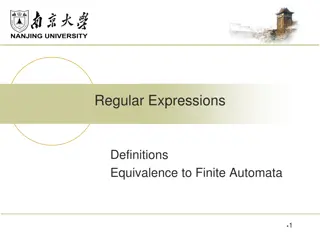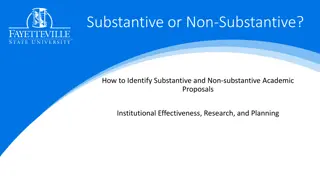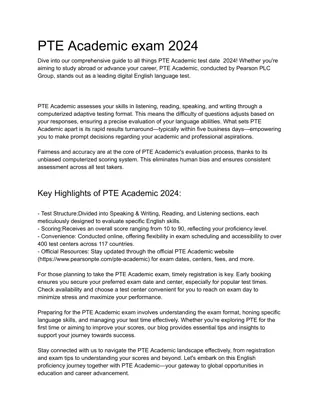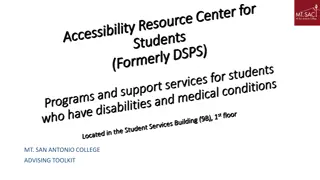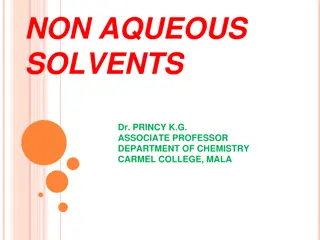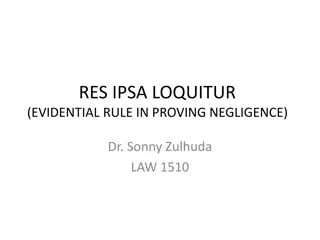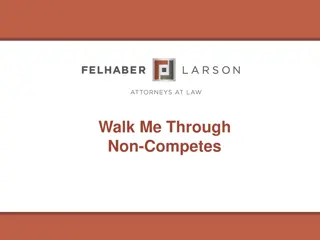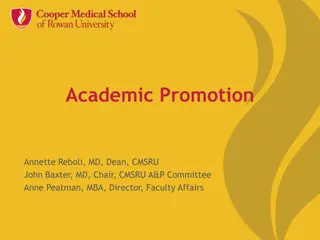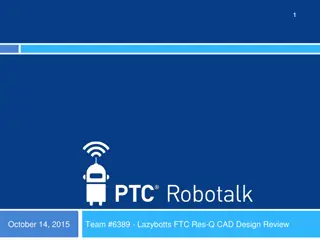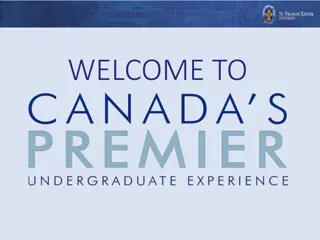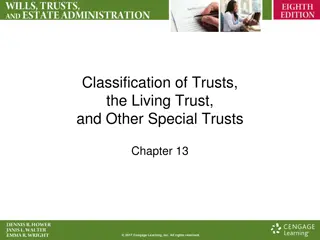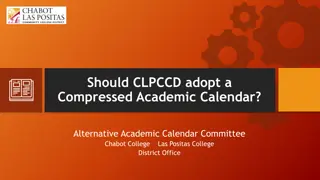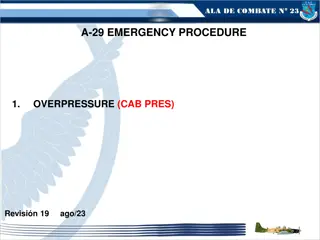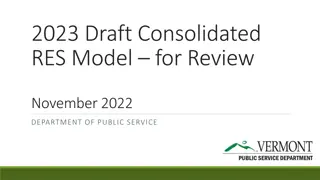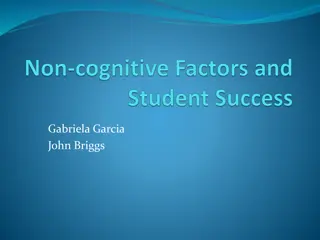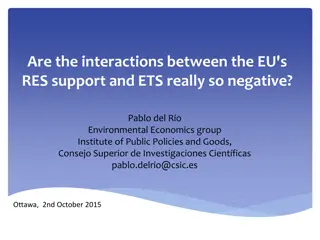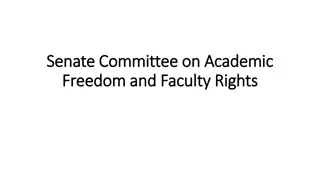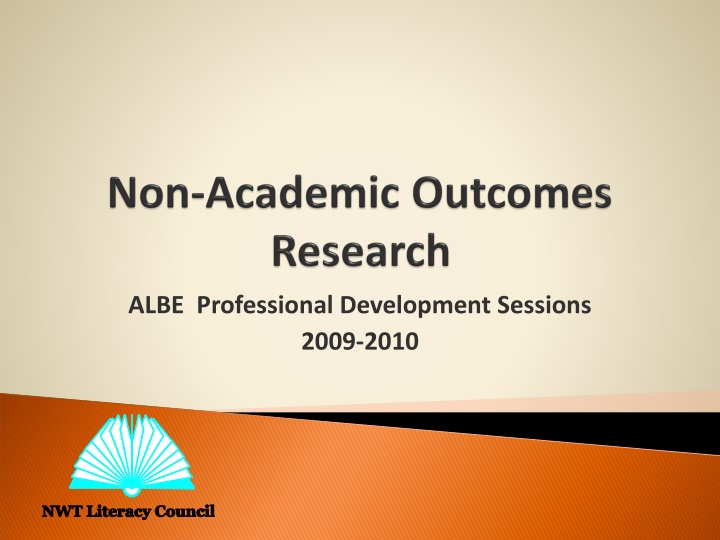
Exploring Non-Academic Outcomes in Adult Education Programs
Discover the significance of non-academic outcomes (NAOs) in adult education, focusing on holistic approaches to documenting and empowering learners. Gain insights into the challenges and achievements in the field of adult literacy and education in the NWT, reflecting on the transition from residential schooling to formal education. Uncover the impact of soft outcomes on hard outcomes and the importance of a comprehensive view in educational frameworks.
Download Presentation

Please find below an Image/Link to download the presentation.
The content on the website is provided AS IS for your information and personal use only. It may not be sold, licensed, or shared on other websites without obtaining consent from the author. If you encounter any issues during the download, it is possible that the publisher has removed the file from their server.
You are allowed to download the files provided on this website for personal or commercial use, subject to the condition that they are used lawfully. All files are the property of their respective owners.
The content on the website is provided AS IS for your information and personal use only. It may not be sold, licensed, or shared on other websites without obtaining consent from the author.
E N D
Presentation Transcript
ALBE Professional Development Sessions 2009-2010
Partners Department of ECE Aurora College NWT Literacy Council Funders Canadian Council on Learning/ ECE
Expand our knowledge of non-academic outcomes Develop and test a culturally appropriate approach to document these outcomes (to stimulate critical reflection; to give voice to learners lived learning experiences, thereby empowering them Develop a training plan and tool to support the documenting of NAOs in all ALBE programs in the NWT
Formal education is still relatively new in the NWT Legacy of residential schooling Current levels of educational attainment Early school leaving Adult literacy statistics (IALSS)
What are non-academic or soft outcomes? Many adult educators believe the picture we paint of learners is incomplete Soft outcomes are intermediate lead to hard outcomes NAOs fit with a holistic worldview Often ignored accountability frameworks favour measurable outcomes over hard-to-measure outcomes We start out by making the important measurable, and end up making the measurable important. (Wiliam, in Westel, 2005)
Three programs: campus-based CLC; medium sized CLC; small CLC Over two academic years Recorded the stories of learners journeys (narrative) Why did you go on the journey? Where did you start from? What helped you? What obstacles were in your way? Where did you get to? What were your successes? Transcribed the stories; took them back to learners to review & verify
45% felt the school system had not served them well 65% regretted leaving school early Impact of residential schooling on learners and families Parents/ grandparents did not understand the importance of education and did not provide support The effects of residential schooling not only affected [our parents] it affected their children us in a negative way.
Personal development: confidence, self-esteem, attitude, identity and potential To support their children To get a (good, better) job To be able to take a post-secondary course
I want to find a job that I enjoy and get security for the future. I want to make sure that my kids have what they need to get their education, as well as a home and food in the fridge. This is for my girl. It s not for anybody else. I don t want to clean bathrooms and other rooms.
Learners goals changed over time as they became more confident From upgrading to career-oriented From certificate to diploma From college to university
Fear (negative views of their own abilities), embarrassment & shame I admit I was scared shitless. I didn t think I could do it. Family responsibilities and disruption I almost gave up a lot of times because of homesickness. Financial challenges It s hard financially, it s hard mentally, emotionally, it s too much work, but that s just how life is.
dumb stupid looked down on degraded failure You know you always think you re dumb but you re not.
Three important areas that ALBE influences: Attitudes Skills (personal, practical) Behaviours
More positive Better attitude towards learning, life and work Changed view of the role of women Coming back to school makes me feel more positive. I don t feel the same as I did last year. I don t even look at the world the same as I did last year, totally different. .
Improved academic skills Improved personal skills New practical skills for everyday life Relationship building skills Improved readiness for further education & employment
Reading and writing Math Computers Science Social Studies
Increased self-confidence & self-esteem Less shy; more able to speak out; a new voice Able to present themselves better More independent Able to handle challenges better (e.g. personal problems) More of a risk taker More relaxed More open More able to stand up for themselves More able to go out A stronger, better, happier person Before I wouldn t say anything because I thought that was for other people, but now I m finding myself. I wouldn t have been able to do that if I hadn t been part of this program.
Commitment oAfraid they would not be able to maintain commitment oA sense of accomplishment (for some the greatest accomplishment) oSeveral learners had never stayed committed to anything before oSupport each other to remain committed stick to the course, come to school, don t miss. It s like nobody gets left behind. .
Described their skills in terms of things they could now do oRead to their children oHelp their children with homework oHelp children become more confident oSpend more time playing with children oVolunteer in the community oMore organized oBecame a role model for others I wouldn t have read to her before. I wouldn t have known any of those words in those books, but now I ve got books and I read to her and she likes it. .
Better communication skills Family relationships improved Families were proud of them Attitudes of people in the community improved towards them Strong relationships among learners They re happy for me. They think I m actually going somewhere. I can see the change. I can feel it in the air. The atmosphere is so different. They look at you and say, Wow! This is my kid. Look at where she is now. .
Not so embarrassed Able to fill out forms and answer questions Able to work with others More of a team player More experience I wouldn t have picked the path I m on if I hadn t attended the learning centre.
Very similar Instructors emphasized: The challenges learners faced The role learners play in looking after families The legacy of residential schools How much learners progressed Learners achievements in self-confidence Learners increased involvement in the community The commitment of learners
Non-academic outcomes are an important aspect of ALBE Learners gained new hope ALBE plays a key role in the transformation to hope Gains in NAOs support academic learning; gains in academic learning support NAOs Reflecting on learning is empowering PLAR I thought I was reading about someone else, and then I realized it was me. ME! I m so excited.
List of types of outcomes & possible indicators Where do we go from here? A framework A tool
[ALBE] could change their lives. There might be seven people that quit that really don t do anything with it. But even if there is one person that did something with it, it s worth it. If you inspire somebody to do something with their life, that s worth it . You can t save everybody.

